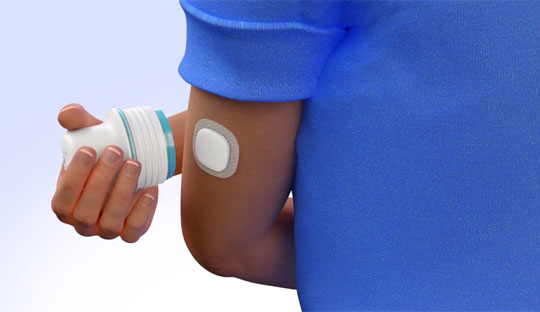7. Device & Drug Updates
FDA Approves Medtronic's Simplera™ CGM

The U.S. Food and Drug Administration (FDA) has recently approved Medtronic's latest innovation, the Simplera™ continuous glucose monitor (CGM). This marks a significant milestone in diabetes care, as Simplera™ is Medtronic’s first disposable, all-in-one CGM, and it’s designed to make life easier for those managing diabetes.
The Simplera™ CGM is half the size of previous Medtronic CGMs, offering a more discreet and comfortable experience. The simplified design makes insertion and daily wear easier than ever, eliminating the need for additional tape to secure the device. This is a huge benefit for users, as it reduces the complexity and discomfort often associated with wearing CGMs.
The Simplera™ platform is designed to work seamlessly with Medtronic’s diabetes management systems. It includes:
- Simplera™ CGM: Designed for use as part of a Smart Multiple Daily Injection (Smart MDI) system, in conjunction with the InPen™ smart insulin pen.
- Simplera Sync™ Sensor: This sensor is designed to be integrated with the MiniMed™ 780G system, Medtronic’s advanced insulin pump system.
The recent FDA approval of Simplera™ CGM paves the way for future updates, including the anticipated submission of an updated InPen™ smart insulin pen app. Once this app is integrated with Simplera™ CGM, users will benefit from a fully connected Smart MDI system, streamlining their diabetes management.
Simplera™ CGM and the Simplera Sync™ sensor have already received CE Mark approval in Europe and were launched earlier this year. The feedback has been overwhelmingly positive, with users praising the ease of use and simple insertion process, which complements the high satisfaction already associated with the MiniMed™ 780G system.
The U.S. Food and Drug Administration (FDA) has recently approved Medtronic's latest innovation, the Simplera™ continuous glucose monitor (CGM). This marks a significant milestone in diabetes care, as Simplera™ is Medtronic’s first disposable, all-in-one CGM, and it’s designed to make life easier for those managing diabetes.
Medtronic plans to roll out Simplera™ CGM in the U.S. with a limited market release, starting with current standalone CGM and InPen™ customers. Meanwhile, the Simplera Sync™ sensor is still under FDA review and is not yet available for commercial use in the U.S.
In addition to these developments, Medtronic has announced a global partnership with Abbott to expand CGM options for people living with diabetes. This collaboration will allow Medtronic to offer a CGM based on Abbott’s latest platform, specifically designed to integrate with Medtronic’s smart dosing devices and software. This partnership is expected to enhance Medtronic’s CGM offerings, providing even more options for diabetes management.
Oral Insulin Nanoformulation

Managing diabetes, especially for those who depend on insulin, can be challenging. Insulin is crucial for keeping blood glucose levels under control, but traditional methods like injections can be inconvenient and sometimes lead to complications like hypoglycemia (low blood glucose). Hypoglycemia is not only uncomfortable but can also be dangerous, increasing the risk of heart problems and affecting the overall quality of life.
Imagine if instead of injections, you could take insulin in a pill form! This idea has been a dream for many, especially for children and older adults who find injections difficult. Scientists are now getting closer to making this a reality with the help of tiny particles called quantum dots (QDs). These particles are so small that they can help deliver insulin directly to where it’s needed in the body when taken orally.
Quantum dots are like microscopic delivery trucks that carry insulin through the stomach and intestines to the liver, which is where insulin naturally goes first after being produced by pancreas. This method mimics the body’s natural insulin delivery process better than injections, which could mean fewer side effects like hypoglycemia.
In recent studies with animals, this new form of oral insulin has shown great promise. It’s been effective in controlling blood glucose without causing the dangerous dips that often come with injected insulin. Plus, it could make managing diabetes much easier and more comfortable for those who currently rely on daily injections.
This breakthrough could change the lives of millions of people with diabetes. Oral insulin would be much easier to use, especially for people who are new to insulin therapy or those who have difficulty with injections. While we’re not quite there yet—there are still many tests and trials to go through—this innovation offers hope that one day, managing diabetes could be as simple as taking a pill.
For enquiries info@jothydev.net.
Please visit: jothydev.net | research.jothydev.com | diabscreenkerala.net | jothydev.com/newsletter




